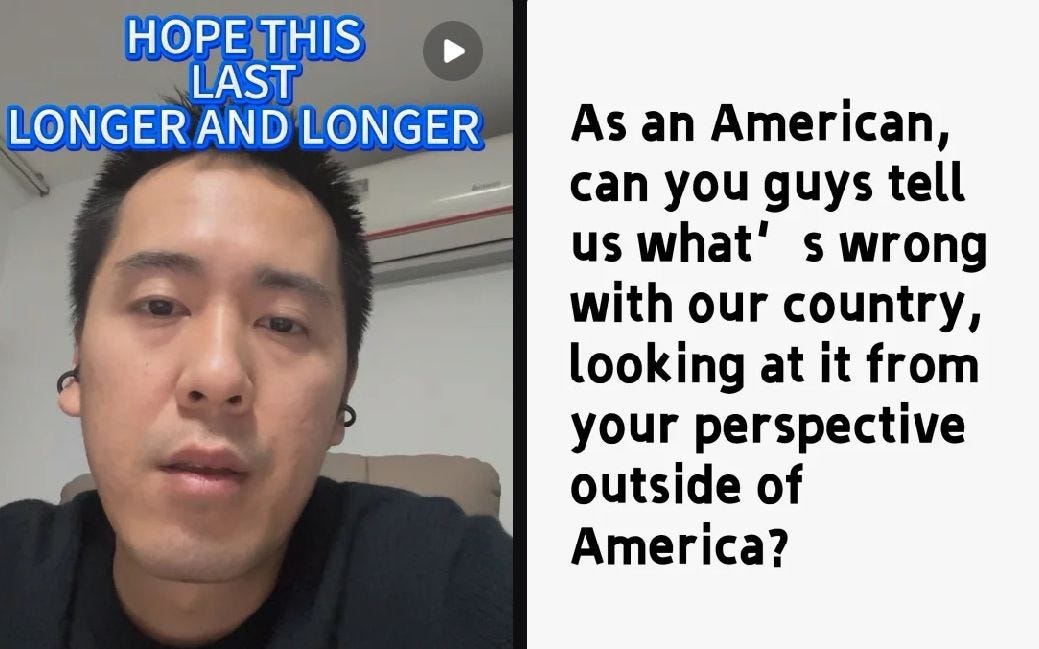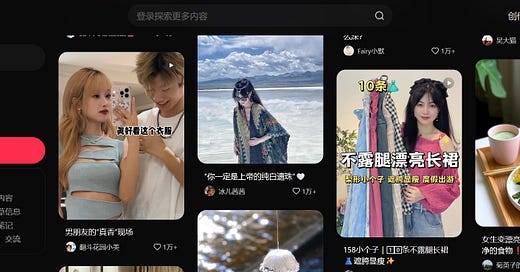TikTok refugees flee to 'Red Note'
If you can't beat the ban, might as well join the other side? Perspectives from an average Chinese 🍌diaspora 小红书 user.
Promise: I joined "Red Note" weeks before #TiktokRefugees started trending on X.
I was getting immensely fed up with the toxicity of Weibo, and wanted a Chinese social media platform that was, well, less of a toilet.
I was recommended 小红书 (xiaohongshu) or "Little Red Book." (PS: I'm going to call it xiaohongshu because Red Note isn't the right name for it. By the way, while many Americans will assume it’s in reference to Mao’s “little red book”, the platform denies the link. Chinese netizens think of the term as their version of the “yellow pages”, although I’m sure some think of it as a ‘tongue-in-cheek’ reference to said infamous book of quotes. I suppose “red” is used because it’s a very auspicious colour for the Chinese.)
Why did I want to tap into Chinese social media? Well, mostly to force myself to read Chinese content without English translation. (As you know, I’m currently upgrading my Chinese skills.)
My feed was full of Chinese dramas, actors and travel videos. But two days ago, Tiktok style videos started flooding into the app. And there was English everywhere?
That was when I found out that Tiktok would be banned on Jan 19.
Most of these "refugees" were from the United States, some were from other countries such as Germany, Britain and more.
Like everyone on xiaohongshu, I was swept up by the thrill and hilarity of it.
Is there anything more ironic than American folks flocking to a China-based app after the international version of a Chinese app was banned? And is there anything funnier than a government trying to prevent its citizens from sharing their data with a Chinese app, only to have said citizens willingly give up their data directly to China instead? And isn’t it wonderfully poetic that an isolationist move ended up fostering one of the most spontaneous cultural exchanges between two "cold war" countries?
One of the best parts of this thing for me was witnessing the heart-warming exchanges between the Chinese and TikTok refugees.

I was really amused that the Americans were so amazed that "everyone is so nice" to them.
As I explained to an American user, "Chinese people pride themselves on treating their guests well." To do otherwise would be shameful, uncivilised behaviour.
It then occurred to me that this was probably the first time some folks in the United States were speaking directly to someone in China.
As both sides awkwardly used AI to translate each other's messages, they exchanged family and cat photos, and answer questions such as "As an American, can you guys tell us what's wrong with our country, looking at if rom your perspective outside of America?"
For the longest time, Americans dwelt on social media platforms where their worldviews and topics dominated. They were comfortable. But now, they're being exposed to a different way of looking at the world and are on someone else's digital territory.
Judging from the many "Is it safe?" or "I'm scared" videos I saw, many were nervous about this.
In South-East Asia, especially in countries where there are many fluent English speakers (like in Malaysia), we've been using American-created social media platforms, like, forever. Therefore, we've made many friends (and enemies) across international borders for decades.
However, folks in China, while they have access to VPNs where they can post things on platforms like Youtube, often prefer to dwell on China-based platforms like Weibo, Wechat, and Xiaohongshu. Yes, it's mostly because of the language barrier but it's also because their platforms are already enough; they don't need to venture beyond China's borders to look for more.
(In fact, China is probably one of the very few countries to have tech sovereignty, but that's a story for another day.)
What I'm seeing is that many Americans seem to finally see for themselves how Chinese people think, live and interact.
I feel their sense of wonder and amazement as Chinese people welcome them in cheerful videos and cat photos. One amusing memes on xiahongshu right now is the "cat tax". Sure, you wai guo ren can write your posts, but we demand cat photos first!
And lo and behold, Chinese people apparently have a sense of humour, as many joke of being Chinese spies and finally meeting the people they spy on. (Fun fact, one of the videos going viral on xiaohongshu is that of a Chinese Trump impersonator!)
For the longest time, people from China and the United States saw each other as amorphous blobs stereotyped by their respective media.
Perhaps xiaohongshu made many realise that at the end of the day, we are human, have families, cats and dogs we love. And that we just want to live in peace and not bomb each other. (Though arguably, I feel that the Chinese side is far more aware of life in the United States than the other way round.)
Accidental cross-cultural exchange, but will it last?
I want this cross-cultural exchange to last forever, but, well, I'm also a realist and a cynic.
Many Tiktokers, despite their enthusiasm to learn Mandarin (one of the most difficult languages in the world), would find the language and cultural barriers difficult to overcome and will give up.
Once the curiosity and hype phase is over, many would probably slink back to (gasp) Meta platforms.
And on the Chinese side, well, patience will start to fade.
Already, there are murmurings from some parts of Chinese xiaohongshu.
Many complain that their feeds are now hijacked by content in a language they don't understand or appreciate.
"This reminds me of my English exams when I was in school," complained one poster.
My feed was replaced by the infamous Tiktok brainrot that had originally made me run screaming from that app. I've seen enough photos of abs, cleavages, biceps and butts in tight lycra to last a lifetime. And for goodness sakes, why do they make videos while lying in bed??
But the trend I most dread are "hot takes" about Chinese culture that I am sure would happen.
As a reluctant member of Reddit and moderator of a China-adjacent Subreddit, I've had to read weird theories about Chinese culture by amateur anthropologists every day.
Part of the reason why xiaohongshu was a nice refuge for me was that I didn't have to brace myself for an ignoramus talking about Chinese culture via a biased Western lens. I don't have to resist the urge to jump into the comments to fight them. I don't have to scroll quickly away before rage robs me of my will power.
Already, some vile trolls on X are egging each other to post photos of Tienanmen Square or talk about Xinjiang on xiaohongshu.
I'm almost dreading the Chinese response. At least we South-East Asians are used to the stupid misconceptions about our cultures, but are Chinese people ready?
Is the government, ready??
I can guaran-damn-tee you that if that happens, the Chinese government would overreact.
I'm fortunate enough not to see these painful posts on the platform so far, but some refugees are already begging other Americans to "not fuck this up".
I really feel for these folks, because these are mostly lovely people that I believe belong on xiaohongshu forever but if there's anything I know about human nature is that, yes, indeed-y, we are guaranteed to fuck this up.
PS: If you want to follow me on xiaohongshu, just search for “Liz T”. I used it as a placeholder but didn’t didn’t realise that you can only change your profile a few times before it locks down. Oops.
Thoughts from people smarter than me
We should welcome these TikTok refugees with open arms rather than fear the incoming "refugee wave." We need the capability to accommodate them while upgrading China's internet landscape. - Chinese Public Opinion Leaders Respond to "TikTok Refugees" Migrating to RedNote by
Analysts believe that the coming days could be a crucial test for Xiaohongshu as new users navigate a platform that contrasts with TikTok’s short-video approach. The platform could additionally face several issues, including tackling harmful content and user retention. - US TikTok users flock to China’s Red Note. Why this matters by
Apparently trying to discourage potential restrictions and shape a discourse - and thus a policy direction - conducive to more room for the badly-needed direct communications between Chinese and Americans, some Chinese public opinion leaders have already gotten to work. - The curious case of Tiktok refugees by
So, are you on “Red Note?”
As I know subscribing to a newsletter can be quite a commitment, you can also give me a tip:





I enjoyed your thorough reporting and the fun accounts of the warm exchanges between Chinese and American xiaohongshu users.
I loved your account of that astonishing moment in social media history. Now I would be curious to hear, how is the situation a few months later – are there American users who stayed on xiaohongshu and if so, how did the exchange go on?